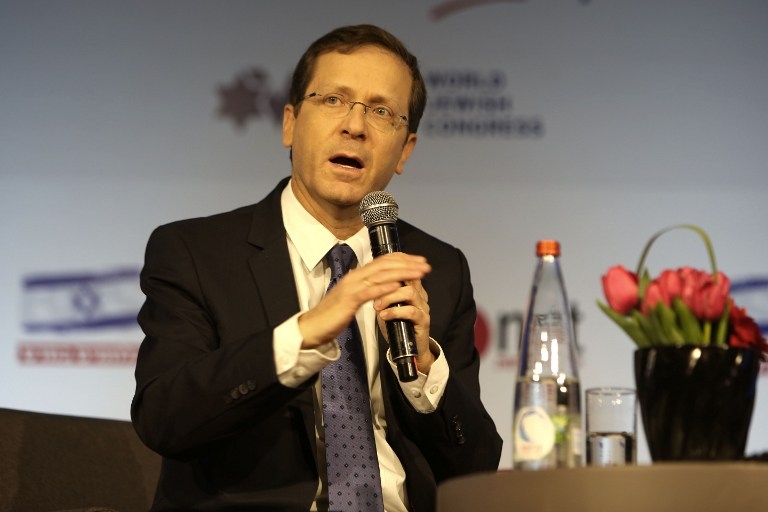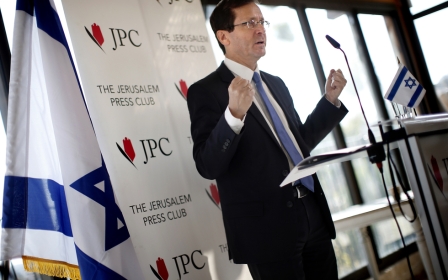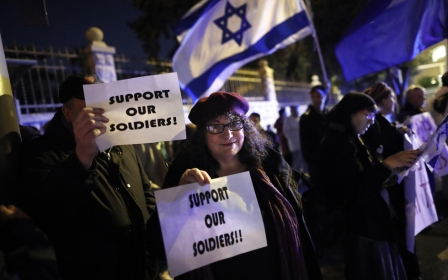'We are not Arab lovers' - Israeli Labor's bankrupt efforts to stave off decline

If an example were needed about how unbalanced the Israeli political system has become, the exchange of words last week between Isaac (Buzi) Herzog, leader of the Zionist Camp and leader of the official opposition, and Education Minister Naftali Bennett, head of the Jewish Home party, and staunch right-wing opposition to Prime Minister Benyamin Netanyahu from within his own government was depressingly instructive.
"We (the Labor party) should not give the impression, with which I encounter in countless meetings with the Israeli public, that we love Arabs," Herzog told activists from his party at a meeting in the southern city of Ashkelon.
Bennett was quick to respond on Twitter. "Israeli Arabs represent 20 percent of the population," he wrote. "They do not 'come in droves' (a reference to Netanyahu's famous call to arms during the last election) and they don't hate us. They are equal citizens and I am education minister. And I am sick of repeating it." The leader of Israel's right wing was giving a lesson to Herzog on human rights.
There is a personal side to this story. Earlier that same week, Herzog was summoned to a police inquiry regarding allegations that he received illegal donations during his campaign to win the Labor leadership in 2013. This investigation comes at a time when his Zionist Camp has fallen in the polls to third or fourth position, with 15 likely seats compared to the 24 it has now in parliament, and when he is already being challenged from within his own party.
This weakness may explain why in response to criticism within his own party on his "Arab lovers" speech, Herzog only doubled the stakes. "I heard that there are some who are not happy with my Zionist approach," he tweeted. "If they want the head of the Zionist Camp to prefer the interests of the Palestinians, they should reconsider their route."
But the fight over the leadership of the Labor Party is just a small part of the story. Only a week before, Zohair Bahlul, the only Israeli-Palestinian MP from the Labor Party, grilled by his own colleagues. Being a popular sports journalist before his election to parliament, Bahlul is much more independent than his Israeli-Palestinian predecessors in the party, who usually came from the party apparatus and were seen almost as "collaborators" by many within the Palestinian minority in Israel.
At the height of the public discussion over the Israeli soldier who shot dead a wounded Palestinian, Abed Fattah al-Sharif, who was lying on the ground in Hebron after he tried to stab an Israeli soldier, Bahlul claimed that the Palestinian attacker cannot be defined as a "terrorist", because he attacked soldiers, not civilians. Soldiers are the symbol of occupation, he explained. Bahlul even compared these Palestinians to the Zionists who fought against British soldiers in Palestine before 1948 in order to establish their independent state.
Bahlul's statements were in no way exceptional, even within the Labor Party. In a famous interview in March 1998, Ehud Barak, then the party's leader, said: "If I were a Palestinian at the right age, I would have joined one of the terrorist organisations at a certain stage." These words did not prevent him from defeating Netanyahu in the general elections a year later.
Yet things have changed in the Labor Party over the last 20 years. Eitan Kabel, a prominent MP closely related to Herzog, claimed that Bahlul has no place in the Zionist Camp. Shelly Yehimovitz, former head of Labor who does hide not her intentions to run again against Herzog, condemned Bahlul harshly.
My children are serving in the army, she said, so "to name Israel's defence force as 'an occupation army' is offensive and runs contrary to my beliefs." Ironically enough, Yehimovitz was being interviewed by Galei Zahal, a radio station run by the Israeli army.
As many commentators reminded her, Herzog was right. Israel's Labor indeed does not have a record of "loving Arabs". The predecessors of the current Labor party were held responsible for the Palestinian Nakba in 1948, imposed martial law on the Palestinian villages and neighbourhoods inside Israel in its first 18 years.
The massacre of Kfar Kassem in which 48 Israeli Palestinians were killed in 1956 occurred under Labor's rule, as well as the killing of six Palestinian demonstrators in 1976 who protested against expropriation of their lands in order to build new Jewish villages and towns.
These chain of events led eventually to a sharp decline of support for the Labor party and its satellite parties within the Palestinian minority in Israel and to the rise of non-Zionist parties such as the Hadash (with the Communist party in it), Balad (Arab nationalists), the Islamic party and others. United in the last elections for the first time in the Joint List, they received more than 90 percent of Palestinian minority votes.
Yet at the same time it should be noted that it was the Labor party under Yitzhak Rabin which formed in 1992 the first (and last) coalition in Israel's history with parties representing the Palestinian minority. The Oslo agreements with the Palestinian Liberation Organisation in 1993 would not have been possible without this coalition.
Twenty years later, Herzog's clear dissociation from the "Arabs" should be viewed as part of a larger picture. While in Rabin's time the main line of confrontation between right and left was whether Israel should seek a peace agreement with the Palestinians or aspire for Greater Israel, today the centre-left led by the Labor party has ceased even to mention the word "occupation".
Instead of challenging the continuation of occupation itself, the centre-left focuses only on the consequences of this occupation. For example, it would condemn the killing of the wounded Palestinian in Hebron and the pressure to release his killer, but would not ask what Israeli soldiers are doing there in the first place. "It is not about loving or not loving the Palestinians," says a Labor MP who preferred not to be named, "it is about treating them in a just and equal way."
The right-wing, which had ruled almost uninterrupted over the last 20 years, has managed to decouple the political discussion from its main issue: the continuation of the occupation.
Herzog went even further. His move to the right seemed premeditated, an effort to stop his voters from sliding towards Yair Lapid and his Yesh Atid party who adopted recently a clear anti-Palestinian jargon. In order to appeal to these voters, Herzog pushed forward his plan for unilateral "separation" from the Palestinians and his party's voice was not heard when human right organisations such as Breaking the Silence were viciously attacked in the last few months.
Yet even if Herzog succeeds in winning votes from the ever more chauvinist Israeli centre, it is hard to see how it will help Labor to return to power anytime soon. Without the support of the 13 seats of the Joint List and with a growing rift between Labor and Israel's Palestinian minority, even if Netanyahu loses power for some surprising reason, the next coalition will have to count on right-wing parties such as Avigdor Lieberman's Israel Our Home party or the Jewish Home of Bennett.
In such a possible new government, Labor will be just another minor party. But this may seem less important to Herzog and much of the Labor party. They have lost any real hope of influencing Israel's political direction and future. And this may be their biggest tragedy.
- Meron Rapoport is an Israeli journalist and writer, winner of the Napoli International Prize for Journalism for a inquiry about the stealing of olive trees from their Palestinian owners. He is ex-head of the News Department in Haaertz, and now an independent journalist.
The views expressed in this article belong to the author and do not necessarily reflect the editorial policy of Middle East Eye.
Photo: Israeli co-leader of the Zionist Union party, Labour Party's leader and head of the opposition, Isaac Herzog, addresses the audience during the Ynet and Yedioth Ahronoth's anti-BDS conference in Jerusalem on 28 March, 2016 (AFP).
New MEE newsletter: Jerusalem Dispatch
Sign up to get the latest insights and analysis on Israel-Palestine, alongside Turkey Unpacked and other MEE newsletters
Middle East Eye delivers independent and unrivalled coverage and analysis of the Middle East, North Africa and beyond. To learn more about republishing this content and the associated fees, please fill out this form. More about MEE can be found here.





